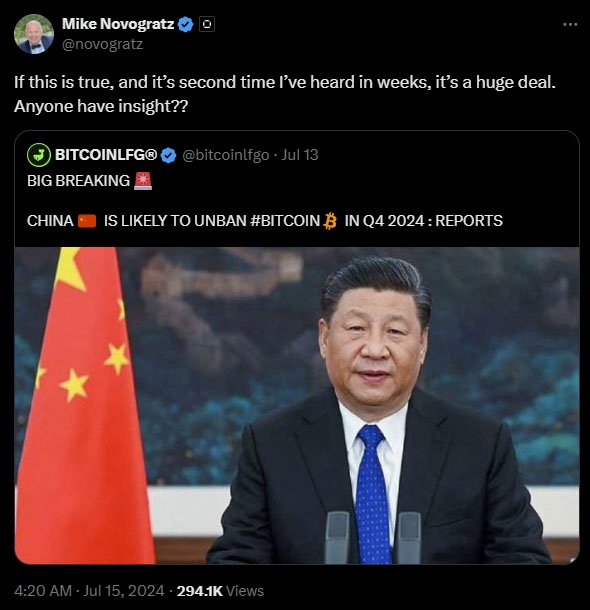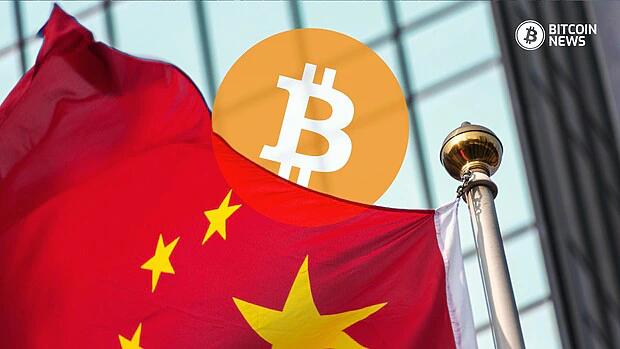In a series of recent reports, the Bitcoin world has been abuzz with speculation that China might lift its longstanding Bitcoin ban by the fourth quarter of 2024.
If true, this move could have significant implications for the global Bitcoin market and China’s position in the digital finance landscape.
China’s history with Bitcoin has been complex and often contentious. The country was initially an enthusiastic supporter of the technology, establishing a domestic Bitcoin exchange in 2011.
However, by 2013, the Chinese government began to take a more cautious approach, banning financial institutions from engaging in Bitcoin transactions. This was the beginning of a series of increasingly stringent regulations.
In 2017, China extended its crackdown by banning Initial Coin Offerings (ICOs) and shutting down domestic digital asset exchanges.
The final blow came in 2021 when the government imposed a comprehensive ban on all digital asset mining and related transactions. This led to a significant exodus of miners and a notable impact on Bitcoin’s market dynamics.
Related: Is Bitcoin Legal? The Futility of Trying to Ban Math and Code
Despite these stringent measures, the demand for bitcoin in China has remained robust. Many Chinese investors turned to overseas exchanges and underground markets to continue trading digital assets.
Recently, rumors have begun to circulate that China might be reconsidering its stance on Bitcoin. Mike Novogratz, CEO of Galaxy Digital and a prominent figure in the world of digital assets, has been one of the voices amplifying these speculations.
In a post on social media platform X, Novogratz mentioned hearing reports that China might lift its Bitcoin ban in the fourth quarter of 2024. He called this potential policy shift a “huge deal” for the industry.

Novogratz mentioned that China’s return to the Bitcoin market might spark a sharp surge in prices, highlighting the significant impact such a move could have on global trading volumes and innovation.
If China were to lift its ban on Bitcoin, the implications could be far-reaching. Several strategic considerations might be driving this potential policy shift.
Experts believe that China’s development of its Central Bank Digital Currency (CBDC), the digital yuan, could coexist with decentralized digital assets like Bitcoin. This dual approach could provide diverse financial tools for economic expansion and enhance China’s position in the global fintech landscape.
Moreover, as the United States continues to deepen its involvement in the Bitcoin market with approvals for Bitcoin ETFs, China might see an opportunity to compete for dominance in the digital currency space.
Embracing Bitcoin could bolster international trade and financial integration, solidifying China’s role in the global economy.
The Bitcoin community has reacted with a mix of excitement and skepticism to the rumors of China lifting its Bitcoin ban.
On one hand, many see it as a positive development that could drive market growth and innovation. On the other hand, some analysts caution that the potential for increased regulation poses risks.
One user on X suggested that China’s reconsideration might be linked to the country’s efforts to balance its electrical grid and make use of overbuilt renewable energy resources. He explains:
“It may also mean that [the government] realize that they’ve overbuilt renewables and allowing all those wind turbines and solar arrays out in the middle of nowhere (which makes it expensive to transmit to urban consumption centers) to mine bitcoin is key to making them profitable.”
However, not everyone is convinced. A Chinese digital asset analyst, Crypto_Painter, labeled the news as potentially fake, arguing that China’s primary goal in banning Bitcoin trading and mining was to prevent capital outflows and stabilize foreign exchange.
Given the current economic climate and the exchange rate of the Chinese yuan to the US dollar, he believes lifting the ban is highly improbable.
In contrast to mainland China’s stringent regulations, Hong Kong has taken a more favorable approach to Bitcoin.
Last year, the region opened up spot Bitcoin trading, signaling a step towards wider digital asset adoption. Some speculate that this move could be a precursor to a broader policy shift in mainland China.
Related: Hong Kong Could Become A Gateway for Chinese Bitcoin Investors
An X user questioned why Hong Kong would embrace Bitcoin if the mainland remains against it, suggesting that Hong Kong’s actions might be the first step towards a policy change in China.
While the official confirmation is awaited, the possibility of China lifting its Bitcoin ban in the fourth quarter of 2024 is a development that the global Bitcoin community is watching closely.
If realized, this move could herald a new era for Bitcoin adoption and integration in one of the world’s largest economies.










